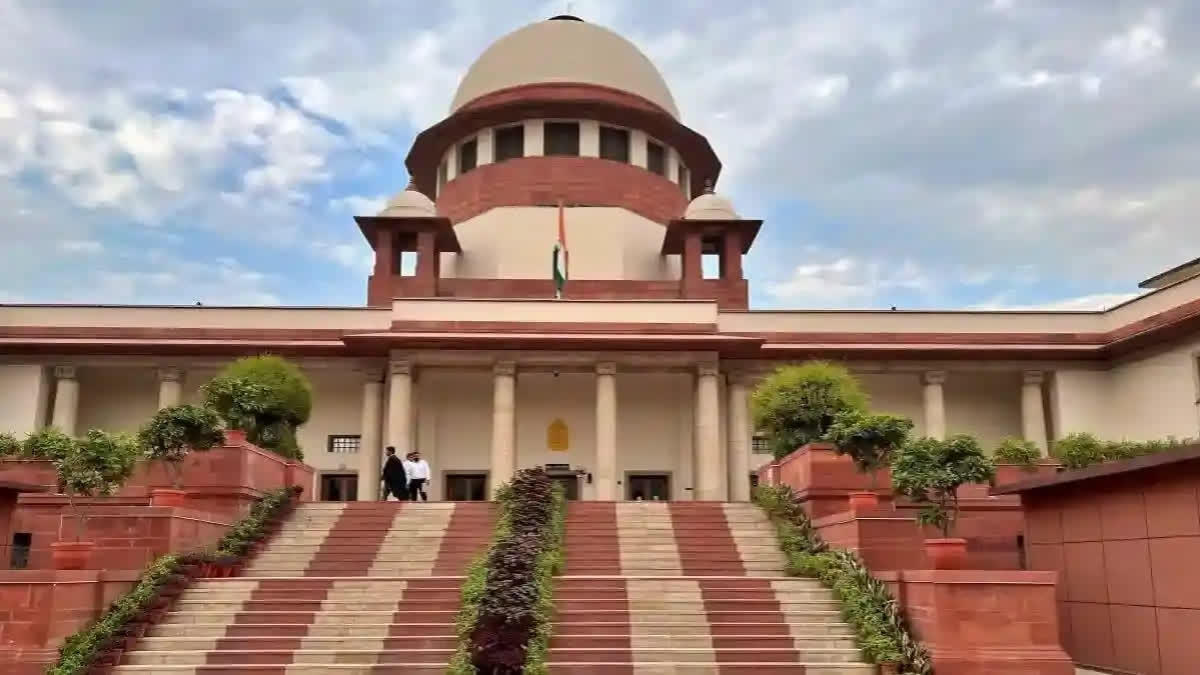New Delhi: Courts have to take a participatory role in the trial and not act as mere "tape recorders" to record whatever said by witnesses, the Supreme Court has observed while deciding a criminal appeal in a 29-year-old murder case.
A three-judge bench led by Chief Justice of India D Y Chandrachud and comprising justices J B Pardiwala and Manoj Misra said: “A criminal case is built upon the edifice of evidence (whether it is direct evidence or circumstantial evidence) that is admissible in law. Free and fair trial is the very foundation of criminal jurisprudence”.
“There is a reasonable apprehension in the mind of the public at large that the criminal trial is neither free nor fair with the prosecutor appointed by the state government conducting the trial in a manner where frequently the prosecution witnesses turn hostile”, said Justice Pardiwala, who authored the judgment on behalf of the bench.
The bench made these observations while dismissing an appeal filed by appellant Anees, who moved the court assailing the judgment of the Delhi High Court, which had dismissed his appeal against a trial court order. The trial court held him guilty of murder of his wife and sentenced him to life imprisonment. The incident occurred on December 12, 1995. The only eyewitness was their 5-year-old daughter, who turned hostile.
Justice Pardiwala said if the questioning by the public prosecutor is not skilled, like in the case at hand, the result is that the state as a prosecuting agency will not be able to elicit the truth from the child witness and “it is the duty of the court to arrive at the truth and subserve the ends of justice”.
“The courts have to take a participatory role in the trial and not act as mere tape recorders to record whatever is being stated by the witnesses. The judge has to monitor the proceedings in aid of justice. Even if the prosecutor is remiss or lethargic in some ways, the court should control the proceedings effectively so that the ultimate objective that is the truth is arrived at," Justice Pardiwala said, in a judgment delivered on May 3.
The bench stressed that the court must be conscious of serious pitfalls and dereliction of duty on the part of the prosecuting agency and the trial judge must exercise the vast powers conferred under Section 165 of the Evidence Act and Section 311 of the Cr.P.C. respectively to elicit all the necessary materials by playing an active role in the evidence collecting process.
“The judge is expected to actively participate in the trial, elicit necessary materials from the witnesses in the appropriate context which he feels necessary for reaching the correct conclusion. The judge has uninhibited power to put questions to the witness either during the chief examination or cross-examination or even during re-examination for this purpose”, said Justice Pardiwala.
The bench said it is the duty of the public prosecutor to cross-examine a hostile witness in detail and try to elucidate the truth and also establish that the witness is speaking lies and has deliberately retracted from his police statement recorded under Section 161 of the Cr.P.C. “A good, seasoned and experienced Public Prosecutor will not only bring the contradictions on record, but will also cross-examine the hostile witness at length to establish that he or she had actually witnessed the incident as narrated in his/her police statement”, said the bench.
In the case at hand, it had been alleged that the accused Anees inflicted as many as twelve blows with a knife on the victim. The couple’s five-year old daughter was the sole eyewitness to the crime, and she was declared hostile.
The apex court said: “All that the public prosecutor did was to put few suggestions to her for the purposes of cross-examination. Surprisingly, even proper contradictions were not brought on record. In other words, the PW-3 (the daughter) was not even appropriately confronted with her police statement.…..The trial judge also failed to play an active role in the present case”.
The bench said the trial judge should have been conscious of the fact that the child was asked to depose in the open court in a charged atmosphere and that too in the presence of the accused who was none other than her own father.
“The relations between the Public Prosecution Service and the judiciary are the very cornerstone of the criminal justice system. The public prosecutors who are responsible for conducting prosecutions and may appeal against the court decisions, are one of judges’ natural counterparts in the trial proceedings and also in the broader context of management of the system of criminal law”, said the bench.
In 1998, the trial court convicted Anees. In 1998, on appeal before the high court, the substantive order of sentence of life imprisonment was suspended and he was released on bail. It took 16 years for the high court to decide the appeal, which ultimately came to be dismissed in May 2024. Anees was once again taken into custody and since then he has been undergoing the sentence of life imprisonment.
The apex court noted that the accused has undergone almost 11 years of imprisonment so far and he is currently nearly 65 years old, and almost half of his life lived so far has been spent undergoing the ordeal of the criminal prosecution.
The court allowed the petitioner to make a representation to the state government praying for remission of sentence. “If any such representation is filed by the appellant, the state government shall look into the same at the earliest and take an appropriate decision on the same in accordance with law within four weeks….”, said the apex court.
Read More


